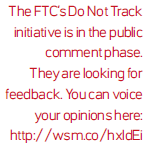FTC Says, "No Cookie For You!

The Federal Trade Commission (FTC) has heard the outcry from consumers - "Do not track me!" And, the FTC is taking action.
A Do Not Track (DNT) proposal is on the table, which would give every consumer the option to opt out of every conceivable trackable ad. No longer would advertisers be able to target users based on their past browsing history, behaviors or purchases - if one were to choose not to be targeted.
What does this mean for Web professionals?
To start, entire businesses could be wiped out. A bustling industry has emerged to specifically serve advertisers and publishers the benefits of targeted online advertising - not least of which are ad networks and ad exchanges. Without the tracking, these businesses lose their special purpose.
Small businesses, small advertisers and small publishers stand to lose the most. These industries have begun to thrive, in part, because of targeted advertising. Think about a common scenario for a Web surfer. She might start by searching a broad topic. At the point of her search she might see a contextual ad or a non-targeted display ad. But digging deeper to get closer to the content she wants will result in a more detailed picture of the end goal - during which, more targeted advertisements are displayed on increasingly relevant websites. The small publisher, in this case, is able to display an ad closely matched to the content on the page and the user's specific interest at the time, based on the past several minutes of Web browsing. The result is an increased likelihood of a click.

Without targeted advertising, these ads are generic and less likely to be effective or get a click. In return, advertising costs go up, revenue goes down and the small publisher is forced to find other revenue streams - like paid content. It's kind of like walking into a store and asking for change: If business is bad, they might ask you to buy something first.
Consumers lose, too. Not only might they be forced to pay for content that was previously free, but they might also end up exposing themselves to more advertising. If advertisers cannot serve specific, targeted advertising, then the alternative is to serve as many ads as possible, to as many consumers as possible.
One way to combat the issue is to create outstanding ads. Advertisers have a responsibility - as a whole - to make ads compelling, relevant, useful or even entertaining so that consumers actually want them.
Another way is to help consumers understand that targeted advertising is not evil. That the data collected is not on a deep, personally identifiable level. We must convince users that targeted ads actually enhance the online experience and truly bring value to them. And, vital to this effort, we must not abuse the privilege.
A few weeks ago, I walked into a shoe store because, naturally, I needed a new pair of shoes. I did some browsing, picking up a pair of shoes here and there; turning them over in my hands. Finally, I decided to try on a pair of brown shoes. The shoe salesman went to the back room and emerged with what I had requested. After trying them on, I decided that I didn't really like them. To which the salesman responded, "I saw you looking at that pair, over there," as he motioned to a shoe I had picked up earlier. "I have a style that's in-between the pair you just tried on and those other ones. Would you like to try them?"
"Yes," I replied. "That sounds great."
I bought the pair suggested to me by the shoe salesman. Had he not noticed me earlier, or paid attention to my preferences; had he been forced to simply take the first pair I tried, put them back in the box and pretend he never saw me before, he would have lost a sale and I would have still needed new shoes. Instead, everybody got what they wanted.
About the Author: Mike Phillips is Website Magazine's senior editor.

Subscribe to Our Newsletter!
Latest in Marketing








